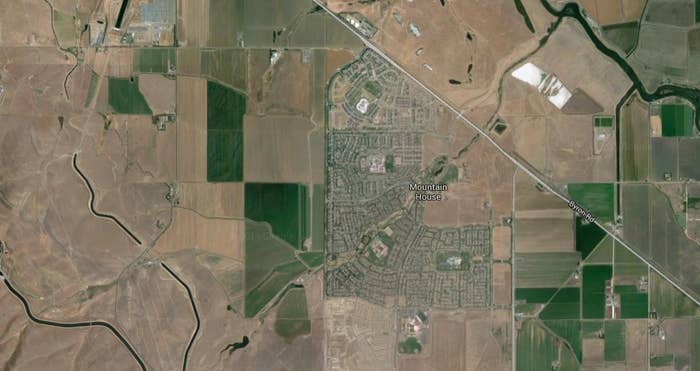
About 60 miles east of San Francisco, a community is running out of water.
Mountain House is a bedroom community home to more than 10,000 people. It's made up of row after row of single family houses, many of which were built over the last decade.
Like the rest of the state, Mountain House is trying to figure out how to deal with California's extreme drought that is now well into its fourth year. As of late July, 99.86% of California was experiencing some form of abnormal dryness, and nearly half the state was seeing the most severe level of drought. The conditions have prompted officials to order mandatory cutbacks, and like most California communities Mountain House currently limits outdoor watering.
But Mountain House's troubles got real in June, when the state announced that senior water rights holders — one of which was the the Byron-Bethany Irrigation District — had to stop drawing surface water. It was an extreme move, and one that is being contested in court, because it cut off water to those with rights to it for more than 100 years.
Fast forward to this week, when the Byron-Bethany Irrigation District made headlines again for allegedly still taking water. In response, the State Water Board announced a planned $1.5 million fine — an unprecedented move amid the drought.
The water district did not respond to BuzzFeed News' requests for comment. However, in a statement on the district's website, it accused regulators of "choosing to make an arbitrary example out of BBID." The district plans to appeal.

A lack of water has the potential not just to turn lawns brown, but also to drag down the community's overall finances.
The fight between the Byron-Bethany Irrigation District and state has forced Mountain House to look for other sources of water. Though officials from Mountain House ignored BuzzFeed News' repeated requests for comment, State Water Board spokesman Andrew DiLuccia said the community has "reached an agreement with South San Joaquin Irrigation District to provide an alternate source of water to supply" through the end of the year.
South San Joaquin Irrigation District also did not respond to BuzzFeed News' request for comment. It was unclear how much Mountain House would be paying for the water, or if the deal had been finalized.
But for Mountain House, the question is bigger than just water supply; without access to water, the community can't build more houses and, according to the Sacramento Bee, it depends on development to fill city coffers.
“Our financial model is a function of orderly development,” Mountain House General Manager Edwin Pattison told the Bee.
It was not exactly clear what effect, if any, the new water deal might have on Mountain House's ability to keep developing and remain financially viable.
What is clear, however, is that Mountain House illustrates how water, or lack thereof, has the potential not just to kill lawns, but also bankrupt communities for reasons that are not drought-related.
Mountain House's financial model also is not unique. Engineer Charles Marohn has described the model, which requires continued and ongoing expansion, as a "ponzi scheme." Marohn told BuzzFeed News that "it’s actually an overall really fragile system."
"A lot of these places will experience robust growth and then they experience collapse," he said. "The lack of water might be the thing that pushes them over the edge."
California's vast infrastructure has allowed it to bypass some of the natural limits on development, Marohn said, but in some areas it has run up against a lack of resources.
"We can continue to inhabit these areas that have historical had drought," he said, "But at the end of the day some of these places are not even going to support the populations that are there."

This conflict over water in a relatively small corner of California could potentially ripple through a much larger economic system.
In Mountain House's case, the community's financial problems have the potential to spread to California's state retirement agency CalPERS — which is responsible for the pensions of more than 1 million workers. According to the Bee, the agency has invested over $1 billion into the community.
When reached for comment, CalPERS referred BuzzFeed News to management company IHP Capital Partners, which did not immediately respond to requests for comment.
The state's investment in Mountain House has faced trouble for years. In 2008, during the housing crisis, the community was described as the "most underwater in America." The housing downturn wiped out hundreds of millions of dollars of CalPERS' investment, which last year was valued at just $291 million.
Though CalPERS plans to stick with its investment in the community and is banking on a general recovery, the situation exposes how the "fragile system" described by Marohn can have surprisingly far reaching effects. During the housing crisis, falling home values and slowed development began wreaking havoc both locally and more broadly. The drought presents another force that could cut off the community's revenue stream and spread through the larger system again.
Marohn said it was possible to make communities work even when resources are scarce and pointed to European cities that use far less water. But he suggested that in drought-plagued California, that would require a major cultural shift away from things like sprawling lawns and wasteful household water use.
"The fact that we’re only starting to think about that when we’re in calamity shows we’re not really serious about it," he added.
